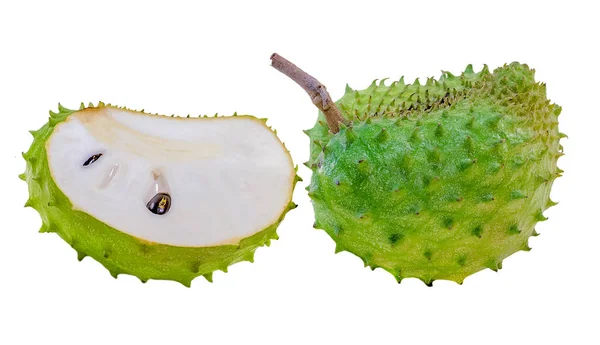17 Amazing Health Benefits of Eating Soursop Fruit – Soursop fruit, also known as graviola, is a tropical fruit with a unique flavor and many health benefits. This fruit is known for its medicinal properties and is widely used in traditional medicine for the treatment of various ailments. In this article, we will explore the nutritional content and top 17 amazing health benefits of eating soursop fruit.
Nutritional Content of Soursop Fruit
Soursop fruit is rich in several vitamins and minerals, including vitamin C, B1, B2, and B6, thiamin, potassium, calcium and magnesium. It also contains fiber and antioxidants. Here is a breakdown of the nutritional content of 100 grams of soursop fruit:
- Calories: 66
- Carbohydrates: 16.8 g
- Fiber: 3.3 g
- Protein: 1 g
- Fat: 0.3 g
- Vitamin C: 20.6 mg
- Thiamin: 0.1 mg
- Vitamin B6: 0.1 mg
- Potassium: 278 mg
- Magnesium: 18 mg
- Calcium: 32 mg
Health Benefits of Eating Soursop Fruit

1. Boosts Immune System
Soursop fruit is a rich source of antioxidants, which play a vital role in boosting the immune system. These antioxidants help to stimulate the production of white blood cells, which are responsible for fighting off infections and diseases.
2. Promotes Digestion
Soursop fruit contains high levels of fiber, which is essential for maintaining a healthy digestive system. Fiber adds bulk to the stool, making it easier to pass through the digestive system. This can help to prevent constipation, bloating, and other digestive problems.
3. Prevents Anemia
Soursop fruit is an excellent source of iron, which is necessary for the production of red blood cells. Eating soursop fruit can help prevent anemia and promote healthy blood circulation.
4. Aids in Weight Loss
Soursop fruit is low in calories and high in fiber, making it an ideal snack for those trying to lose weight. The fiber in soursop fruit helps to keep you feeling full, reducing your overall calorie intake.
5. Lowers Blood Pressure
Soursop fruit contains potassium, which is essential for maintaining healthy blood pressure levels. Eating soursop fruit can help lower blood pressure and reduce the risk of heart disease.
6. Reduces Inflammation
Soursop fruit contains anti-inflammatory compounds that can help to reduce inflammation throughout the body and may be particularly helpful for those with arthritis or other inflammatory conditions.
7. Fights Against Cancer
Soursop fruit contains acetogenins, which are compounds that have been shown to have anti-cancer properties. These compounds have been found to be effective against various types of cancer cells such as breast, lung, and prostate cancer cells., including those that are resistant to chemotherapy.
8. Treats Respiratory Infections
Soursop fruit has been traditionally used to treat respiratory infections such as coughs and colds. The high vitamin C content in soursop fruit helps to boost the immune system and fight off infections.
Don’t miss | 17 Amazing Health Benefits Of Eating Green Grapes
9. Relieves Constipation
Soursop fruit is high in fiber, which is essential for maintaining regular bowel movements. Eating soursop fruit can help relieve constipation and promote healthy digestion.
10. Enhances Brain Function
Soursop fruit contains high levels of vitamin B1, which is essential for the proper functioning of the nervous system. It also contains antioxidants that protect the brain from oxidative stress, which can lead to cognitive decline.
11. Prevents Osteoporosis
Soursop fruit is a good source of calcium, which is essential for maintaining healthy bones. Regular consumption of soursop fruit can help prevent osteoporosis and other bone-related diseases.
12. Promotes Wound Healing
Soursop fruit contains high levels of vitamin C, which is necessary for the production of collagen. Collagen is a protein that is essential for wound healing and maintaining healthy skin.
13. Regulates Blood Sugar Levels
Soursop fruit has a low glycemic index, which means it does not cause a rapid increase in blood sugar levels. This makes it an ideal snack for people with diabetes or those trying to regulate their blood sugar levels.
14. Improves Skin Health
Soursop fruit contains high levels of vitamin C and antioxidants, which are essential for maintaining healthy skin. These nutrients help to reduce the effects of aging and promote skin elasticity.
15. Boosts Energy Levels
Soursop fruit is a good source of carbohydrates, which provide the body with energy. Eating soursop fruit can help boost energy levels and improve overall physical performance. These include vitamin B6, thiamin, and magnesium.
16. Helps with Insomnia
Soursop fruit contains tryptophan, an amino acid that is known to help promote sleep. Eating soursop fruit can help to improve sleep quality and can help to reduce insomnia.
17. Promotes Heart Health
Soursop fruit is rich in potassium, which is essential for maintaining a healthy heart. Potassium helps to regulate blood pressure and can help to prevent heart disease and stroke.
Conclusion
Soursop fruit is a nutritious and delicious tropical fruit that offers many health benefits. From boosting the immune system to improving skin health, regular consumption of soursop fruit can help promote overall health and well-being.
Don’t miss | 17 Impressive Health Benefits of Abacha – African Salad
FAQs
A: Yes, soursop fruit is safe to eat. However, it is recommended to consume it in moderation as excessive consumption can lead to side effects such as nausea and vomiting.
A: Yes, soursop fruit can aid in weight loss as it is low in calories and high in fiber, which helps to keep you feeling full.
A: Yes, soursop, also known as graviola, may have side effects. Although soursop is a natural fruit, some of its compounds may interact with medications or cause adverse effects in certain individuals. Some of the potential side effects of soursop include nerve damage, liver toxicity, allergic reactions, low blood pressure etc.
A: Yes, soursop fruit contains a small amount of iron. According to the USDA National Nutrient Database, 100 grams of soursop pulp contains approximately 0.6 mg of iron. However, this amount is relatively low compared to other iron-rich foods, and soursop is not considered a significant source of iron.
A: It is recommended to consult with a healthcare professional before consuming soursop fruit during pregnancy as it may have adverse effects.






